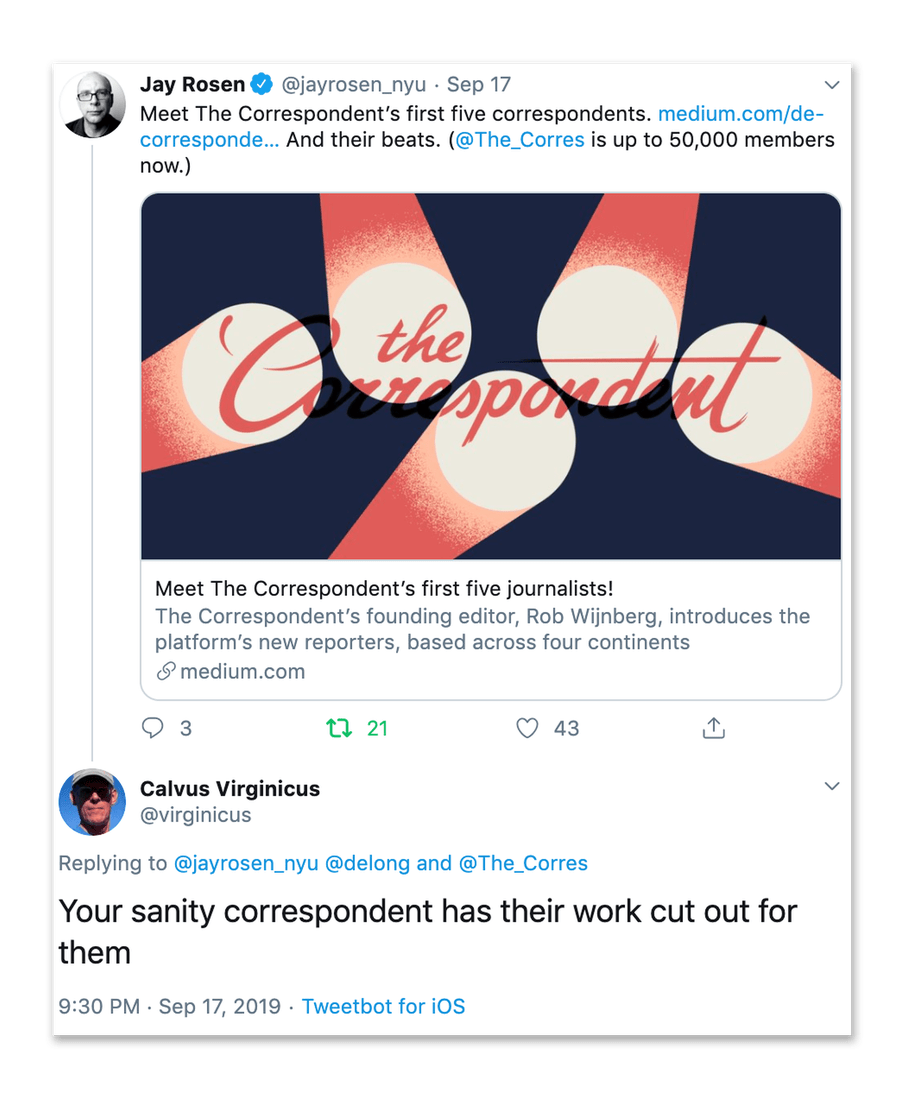You’d be spoilt for choice if you want reasons why journalism today is considered a foolish career choice. Vanishing jobs, shitty pay, terrible working hours, crumbling press freedom, and – the bloodiest blow of them all – fake news torpedoing the very foundations of the profession.
When I decided to join The Correspondent, I was courting one more potential disaster: crossing over from the newsdesk – that cosy, invisible corner of the newsroom – to the frontlines, as a writer.
I was leaving one of India’s biggest media empires to join a tiny startup with huge dreams and an adventurous business model. And I was signing up for something I could barely conceive of: working from home with a team fanned out from Amsterdam to Lagos and Minnesota.
On top of everything, the subject I wanted to write about, mental health, wasn’t among the ones that most of our 50,000 founding members wanted us to cover. (That honour went to climate change, inequality, and artificial intelligence – all of which we do now cover in various forms.)
Only one thing could save me (and the editors who hired me) from buyer’s remorse: proof that our readers cared.

Three months’ worth of stories and hundreds of member comments and emails have reassured me that they do care. I have learnt more about the global mental health movement in this time by way of tips from members – psychiatrists, psychologists, philosophers, theologians, historians, and people who are none of the above but still care deeply – than I could have ever hoped.
A very vocal and invested community has flowered around Sanity, completely organically, proving every day that stories about the human mind deserve their own space in a serious media venture.
But grateful as I am for every kind word, the greatest gift of 2019 wasn’t a compliment. It came from an angry member. They took issue with the very name of my beat and my decision to focus on the politics and philosophy of mental health, instead of making my reporting all about diseases.
“I’m insulted by your use of the word sanity with no discussion or even mention of psychosis (schizophrenia, manic or other) … ,” the member wrote. “Is this a joke? Is this supposed to be cute? I have experienced manic-psychosis and am diagnosed bipolar type 1. Call yourself the mental health correspondent. Not the sanity correspondent.”
It was day 1. Among the rush of congratulatory messages, I remember trying to absorb this rebuke once, twice, three times. First I was defensive, then curious, before finally accepting that I had already managed to badly upset someone.
Grateful as I am for every kind word, the greatest gift of 2019 wasn’t a compliment. It came from an angry member.
I never replied. I didn’t know how. Today, let me try.
Dear reader,
Thank you for serving me an early reminder of exactly who I write for. Not experts, not other journalists, not policymakers, but people fighting to establish mental health as a human right, people who are hurting, people for whom sanity isn’t about “cute” intellectual arguments, but about their very identities.
I write for people like you, and people like me.
I understand how my decision to not name this beat "mental health" could have felt like betrayal. Like I was denying you your reality.
With the benefit of time to think, you’ve helped me make a few decisions. To begin with, Sanity will always be, first and foremost, about us. Second, I will always keep it real. Let me explain.
It is fashionable in certain mental health circles to shun all talk of disease. Ostensibly, it’s a reaction against the over-medicalisation of mental health. But abolishing the idea of illness also endangers the hard-earned rights of those who live with illness or care for the ill. That kind of erasure will never happen here.
These decisions you have inspired me to make have taken me to completely new places: I am learning a new language to recast the mental health conversation; exploring corners of the human mind I was intimidated by before; seeking out neglected voices; training myself to write to communicate rather than to impress.
Because of all this, I go into 2020 grateful that I get to call myself a journalist. And I have you to thank for it.


